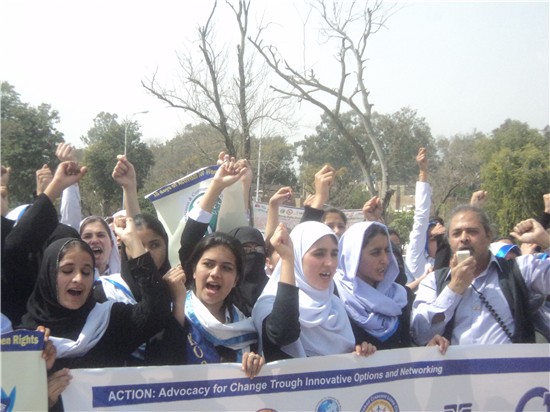 Statement by Civil Society and Women’s Movement
Statement by Civil Society and Women’s Movement
of Islamabad-Rawalpindi, International Women’s Day, 8th March 2012
We pay tribute to the girls and women of Pakistan for their ongoing struggle for rights, equality and justice. We reaffirm our commitment to creating an enabling environment where every day of the year would be Women’s Day. We acknowledge and appreciate the support and solidarity of progressive Pakistani men in the women’s rights movement.
Acknowledging the recent Parliamentary affirmative legislation as an initial step, we call upon the provincial legislatures, under the 18th Constitutional Amendment (2010) devolution, to enact stronger laws, and the provincial governments to implement them.
We are gravely concerned about the impact on girls and women of rapidly escalating extremism, intolerance and talibanization of our society; along with increased poverty and its feminization; unemployment and exploitative labour, food insecurity, galloping inflation, economic recession, lack of education and health (especially reproductive health) services and rights, shortages and unaffordable prices of food, shelter, fuel, energy, transportation and other basic needs; the alarming situation in Balochistan, continuing enforced disappearances (Missing Persons), lack of access to justice, absence of law and order; unacceptably high debt servicing and military expenditures; perpetuation of patriarchal, feudal and tribal mindsets; continuing illegal Jirgas and Punchayats; and deteriorating human security and human rights.
We demand the following:
- Repeal of discriminatory laws and mechanisms, especially Hudood Ordinances, Evidence, Blasphemy, Qisas and Diyat, Shariat Act and Federal Shariat Court.
- Enactment of laws and effective policies for women on domestic violence; acid crimes; traditional discriminatory practices (especially badal-e-sulah, sang chatti, vanni, swara, wulwar); “honour” killings; forced conversions; forced and under-age marriages; home-based, agricultural and livestock workers; citizenship; non-Muslim minority women’s personal laws; and strengthening the Muslim Family Laws Ordinance (1961).
- Immediate eradication of illegal Jirgas and Punchayats (as per Sindh High Court 2004 and Supreme Court 2006 orders to provincial and federal governments).
- Effective law-enforcement institutional mechanisms, coordinated through the Interior/Home Departments, Human Rights Ministry/Departments, NCSW/PCSWs, provincial Women’s Development Departments, with Civil Society included in overseeing and monitoring.
- Training and re-training of the law enforcement agencies, judiciary and medico-legal community on the laws and their implementation, gender-sensitization, gender justice and equality norms.
- Public media campaigns for mass awareness-raising on women’s rights, laws and equality in a non-theocratic framework.
- Ensuring free, compulsory and universal education, enrollment and completion of high school by all girls and boys, irrespective of religion, ethnicity or geography.
- Electoral reforms to ensure women’s political participation in all three tiers; universal adult franchise; contesting through 17% general and 33% reserved seats; immediate legal, administrative actions against “agreements” by political parties to deny women the right to vote or contest; and 50% representation in all legislative and party committees/councils.
- Special provisions for girls and women in humanitarian and conflict responses, e.g. Balochistan, FATA, Malakand; participation in conflict resolution, peace building and development processes.
- Adherence to international commitments as a State Party to CRC, CEDAW; ILO and HRC Conventions.